Sixty-three years ago today, a young Alabama writer by the name of Nelle Harper Lee published her debut novel: a Southern Gothic-adjacent bildungsroman about racial injustice and familial love in the American South.
In the months leading up to publication, Lee’s editors at Lippincott were keen to manage expectations, telling the author that her novel would probably sell only a few thousand copies.
Things, as we now know, played out a little differently.
Indisputably one of the best-loved American stories of all time, To Kill a Mockingbird has been translated into more than forty languages, sold more than forty million copies worldwide, served as the basis for an Oscar-winning film starring Gregory Peck, and consistently been voted one of the best novels of the twentieth century by librarians across the country. It has also become one of the country’s most frequently challenged and banned books.
To mark this publication anniversary, here’s a look back at the very first reviews of To Kill a Mockingbird.
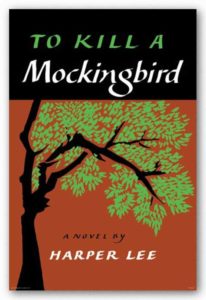
You never really understand a person until you consider things from his point of view…
Until you climb inside of his skin and walk around in it.
“In her first novel, Harper Lee writes with gentle affection, rich humor, and deep understanding of small-town family life in Alabama … Macomb has its share of eccentrics and evil-doers but Miss Lee has not tried to satisfy the current lust for morbid, grotesque tales of Southern depravity … The dialogue of Miss Lee’s refreshingly varied characters is a constant delight in its authenticity and swift revelation of personality. The events connecting the Finches with the Ewell-Robinson lawsuit develop quietly and logically, unifying the plot and dramatizing the author’s level-headed plea for interracial understanding … it is no disparagement of Miss Lee’s winning book to say that it could be the basis of an excellent film.”
–The New York Times Book Review, July 10, 1960
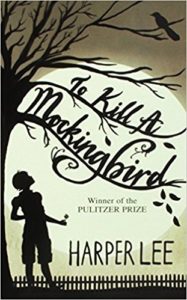
“All the magic and truth that might seem deceptive or exaggerated in a factual account of a small town unfold beautifully in a new first novel called To Kill a Mockingbird. At a time when so many machine-tooled novels are simply documentaries disguised behind a few fictional changes, it is pleasing to recommend a book that shows what a novelist can accomplish with quite familiar situations … To Kill A Mockingbird opens the chrysalis of childhood quietly and dramatically … Miss Lee’s characters are people to cherish in this winning first novel by a fresh writer with something significant to say, south and north.”
–The New York Times, July 13, 1960
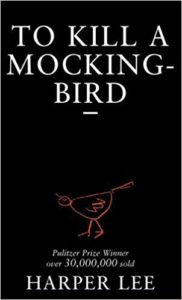
“Clearly, Scout Finch is no ordinary five-year-old girl—and not only because she amuses herself by reading the financial columns of the Mobile Register, but because her nine-year-old brother Jem allows her to tag along when he and Dill Harris try to make Boo Radley come out.
Boo is the Radley son who has not shown his face outside the creaky old family house for 30 years and more, probably because he has ‘shy ways,’ but possibly—an explanation the children much prefer—because his relatives have chained him to his bed. Dill has the notion that Boo might be lured out if a trail of lemon drops were made to lead away from his doorstep. Scout and Jem try a midnight invasion instead, and this stirs up so much commotion that Jem loses his pants skittering back under the fence.
Scout and her brother live in Maycomb, Alabama, where every family that amounts to anything has a streak—a peculiar streak, or a morbid streak, or one involving a little ladylike tippling at Lydia Pinkham bottles filled with gin. The Finch family streak is a good deal more serious—it is an overpowering disposition toward sanity. This is the flaw that makes Jem interrupt the boasting of a lineage-proud dowager to ask ‘Is this the Cousin Joshua who was locked up for so long?’ And it is what compels Lawyer Atticus Finch, the children’s father, to defend a Negro who is charged with raping a white woman. The rape trial, Jem’s helling, and even Boo Radley are deeply involved in the irregular and very effective education of Scout Finch. By the time she ends her first-person account at the age of nine, she has learned that people must be judged, but only slowly and thoughtfully.
Author Lee, 34, an Alabaman, has written her first novel with all of the tactile brilliance and none of the preciosity generally supposed to be standard swamp-warfare issue for Southern writers. The novel is an account of an awakening to good and evil, and a faint catechistic flavor may have been inevitable. But it is faint indeed; novelist Lee’s prose has an edge that cuts through cant, and she teaches the reader an astonishing number of useful truths about little girls and about Southern life. (A notable one: ‘Naming people after Confederate generals makes slow steady drinkers.’) All in all, Scout Finch is fiction’s most appealing child since Carson McCullers’ Frankie got left behind at the wedding.”
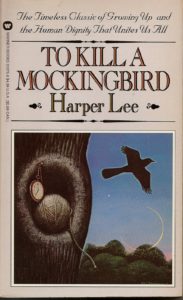
“Almost all the elements of the ‘southern’ novel are to be found somewhere or other in Harper Lee’s To Kill a Mockingbird, but they seem to wear a look of innocence, an aura of freshness, as if we were encountering them for the very first time … there are memorable moments in this story, some vivid and candid portraits in black and white, a gentle, persuasive humor, and a glowing goodness in the central figures. There is a timelessness about them and Miss Lee’s novel leaves one feeling that they will prevail in the difficult and painful adjustments the South must inevitably make. At least one has hope, and is grateful for it.”
–The Los Angeles Times, August 7, 1960
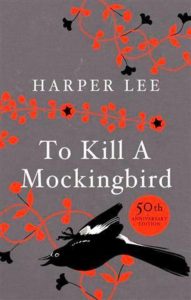
“Harper Lee’s To Kill A Mockingbird is sugar-water served with humor … It is frankly and completely impossible, being told in the first person by a six-year-old girl with the prose style of a well-educated adult. Miss Lee has, to be sure, made an attempt to confine the information in the text to what Scout would actually know, but it is no more than a casual gesture toward plausibility … A variety of adults, mostly eccentric in Scout’s judgment, and a continual bubble of incident make To Kill A Mockingbird pleasant, undemanding reading.”
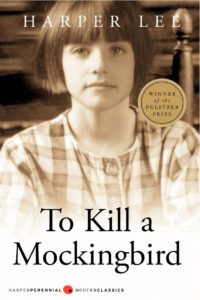
“…a wonderfully absorbing story … [it] will come under some fire in the Deep South … The fact is simply that she has written a wonderfully absorbing story, unencumbered by either of the gimmicks—the bedroom or bestiality—which are supposed to be the only things that sell fiction today.”
























































